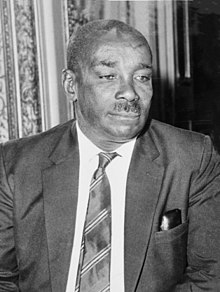Abeid Karume
| Abeid Karume عبيد كريم |
|
|---|---|

Abeid Karume in 1964
|
|
| 1st President of Zanzibar | |
|
In office 26 April 1964 – 7 April 1972 |
|
| Preceded by | Himself President of People's Republic of Zanzibar and Pemba |
| Succeeded by | Aboud Jumbe |
| 1st Vice President of Tanzania | |
|
In office 29 October 1964 – 7 April 1972 |
|
| President | Julius Nyerere |
| Preceded by | Position Established |
| Succeeded by | Aboud Jumbe |
| President of People's Republic of Zanzibar and Pemba | |
|
In office 12 January 1964 – 25 April 1964 |
|
| Preceded by | Jamshid bin Abdullah (Sultan of Zanzibar) |
| Succeeded by | Position Abolished (Julius Nyerere As President of Tanzania) |
| Personal details | |
| Born |
4 August 1905 Mwera, Zanzibar |
| Died | 7 April 1972 (aged 66) Zanzibar City, Zanzibar |
| Nationality | Tanzanian |
| Political party | Afro-Shirazi Party |
| Children |
Amani Ali |
| Religion | Islam |
Abeid Amani Karume (4 August 1905 – 7 April 1972) was the first President of Zanzibar. He obtained this title as a result of a violent revolution which led to the deposing of the last Sultan of Zanzibar Sultan Jamshid bin Abdullah in January 1964. Three months later, the United Republic of Tanzania was founded, and Karume became the first Vice President of the United Republic with Julius Nyerere of Tanganyika as president of the new country. He was the father of Zanzibar's former president – Amani Abeid Karume.
Allegedly born at the village of Mwera in 1905, Karume had little formal education and worked as a seaman before entering politics. He left Zanzibar in the early years of his life, traveling among other places to London, where he gained an understanding of geopolitics and international affairs through exposure to African thinkers such as Kamuzu Banda of Malawi. Karume developed an apparatus of control through the expansion of the Afro-Shirazi Party and its relations with the Tanganyika African National Union party.
On 10 December 1963, the United Kingdom granted full independence to Zanzibar after the Zanzibar National Party (ZNP) and Zanzibar and Pemba People's Party won the elections. The Sultan was a constitutional monarch. Initial elections gave government control to the ZNP. Karume was willing to work within the electoral framework of the new government, and actually informed a British police officer of the revolutionary plot set to take place in January.
...
Wikipedia
